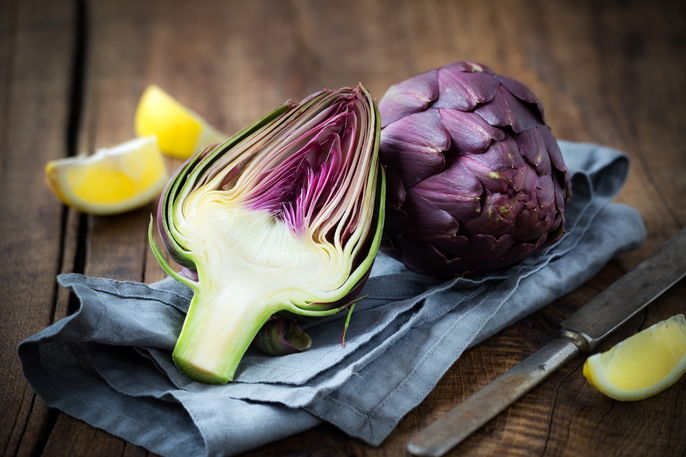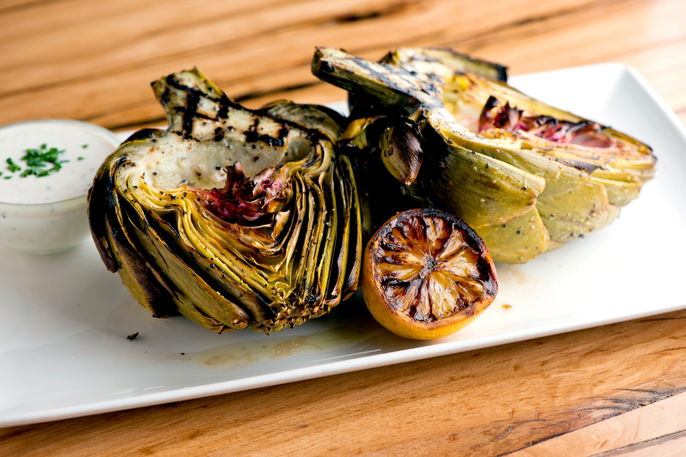Artichokes are a medicinal plant that is rich in water, giber and flavonoids. It has a high vitamin C content, and is a great source of minerals like potassium and phosphorus. This plant also has antioxidant, anti-inflammatory, diuretic, probiotic and anti-dyspeptic action which can make it a great way to naturally combat indigestion.
This plant can also reduce cholesterol and glucose levels, which can prevent illnesses like obesity, heart attacks and diabetes. This plant can also promote weight loss, as it helps to suppress appetite and promote fluid retained in the body.
Fresh artichoke can be purchased at some supermarkets or farmer’s markets, while its leaves can be purchased at natural health stores or pharmacies. Artichokes can be prepared in many ways: it can be cooked, grilled, added to salads, infused as a tea or added to a juice or smoothie.

Health benefits
Artichokes can offer many health benefits, like:
1. Promoting weight loss
Artichokes are rich in inulin, a fiber that is present in many vegetables. Inulin can promote weight loss, as it is digested at a slower rate, which keeps you fuller for longer and reduces hunger.
Because of its low calorie count and due the fact it helps to eliminate retained fluid, artichokes are a great item to add to weight loss diets. Learn more about the foods to eat and avoid during a weight loss diet and how to formulate a meal plan.
2. Decreasing cholesterol
Because it is rich in fiber, like inulin and pectin, artichokes help to decrease the absorption and increase the elimination of fat through the stool. This promotes the reduction of "bad" cholesterol (LDL) and total cholesterol in the blood.
Furthermore, artichokes are rich in antioxidant compounds, like flavonoids, carotenoids and vitamin C. These prevent the formation of free radicals, and prevent the formation of fatty plaques in the blood, which can reduce the risk for atherosclerosis.
3. Preventing diabetes
Artichokes boast a low glycemic index because of its high fiber and protein content. This helps to regulate glucose and insulin levels in the blood, preventing diabetes. Learn more about what to eat for a diabetic diet, as well as the foods you should avoid.
4. Managing high blood pressure
Eating high potassium foods, like artichokes, increase urine production, which helps to eliminate excess sodium in the body and manage or prevent hypertension.
Artichokes are also rich in antioxidants, like flavonoids and carotenoids, which inhibit the excessive production of free radicals. This helps to keep arteries healthy and prevent high blood pressure. Check out other natural remedies for high blood pressure that you can try at home.
5. Reducing wrinkles and skin flaccidity
Because it is rich in bioactive compounds, like vitamin C, flavonoids and carotenoids, artichokes help to combat free radicals and boost collagen production that contribute to wrinkles and flaccidity.
Artichokes is also high in fibers that regulate blood sugar levels, prevent cellular inflammation, and consequently, reduce flaccidity and early aging. See the other vitamin C foods that you can add to your diet to improve your skin’s appearance.
6. Detoxing the liver
Artichokes a great source of antioxidant compounds, like flavonoids and polyphenols, which protect the liver and help to eliminate toxins through the urine, stool or sweat. Read more about the foods, teas and drinks you should consume to detox the liver.
Because of its ability to protect and boost liver function, artichokes can also relieve symptoms of indigestion, like nausea, general malaise and abdominal pain.
7. Combating constipation
Artichokes are rich in fiber and water, which helps to add bulk to the stool and promote bowel movements. It is a great food to combat constipation. Learn about other natural laxatives that you can consume to soften stools and keep you regular.
Artichokes are also rich in inulin, a type of prebiotic fiber that feeds good gut bacteria, keep the intestinal flora healthy.
Nutritional information
The following table outlines the components found in 100 g of cooked artichokes:
It is important to highlight that the benefits of artichokes are only attainable when it is a part of a lifestyle consisting of regular physical activity and a healthy, balanced diet.
How to take
Artichokes can be consumed in their natural state, grilled, or sauteed and added to pasta, salads and juices. Its leaves can be used to prepare tea or it can be consumed as a supplement.
Artichoke supplements in capsule form can be taken before or after the main meals of the day with a glass of water. Recommended dosing can range from 400 to 6000 mg of this supplement per day.
It is important to remember that artichoke supplementation should be guided by a doctor or other health professional specialized in the use of medicinal plants.
Side effects & contraindications
Artichokes should not be consumed by people with gallbladder problems, hepatitis or liver cancer without consulting their doctor. This plant is not recommended for those who take anticoagulant medication, as certain properties can decrease the action of these medications. In addition, artichokes should not be consumed by pregnant or breastfeeding women, or by children under 12 years of age.
Artichoke supplements or teas can cause abdominal pain, diarrhea, gas, nausea, weakness and heartburn in some people.
Artichoke recipes
Check out these health and delicious artichoke recipes to add to your weekly meal plan:
1. Artichoke tea
Ingredients:
- 1 liter of water
- 1 teaspoon (5 to 6 g) of dried artichoke leaves
How to prepare:
Boil the water in a pot or kettle, then remove from heat. Add the artichoke leaves to the water and allow to soak for 5 to 10 minutes. Strain the infusion, allow to cool, and drink up to 3 cups per day.
2. Grilled artichoke

Ingredients:
- 2 large artichokes
- 1 lemon
- ¼ cup of olive oil
- 4 garlic cloves
- 1 liter of filtered water
- 1 teaspoon of salt
- ½ a teaspoon of black pepper
How to prepare:
Fill a pot with water, place on high heat and add ½ of the teaspoon of salt. Cut the artichoke stalks close to the base, and rub the lemon on them to prevent darkening. Cut the tips off with a knife and trim the leaves using scissors. Cut the artichoke in half and remove the fuzz (the choke). Wash the artichokes well.
Once the water is boiling, add the artichokes and squeeze in some lemon juice. cover the pot and boil for 25 to 30 minutes, or until the artichokes are soft.
Then, rinse the artichokes well. Squeeze the rest of the lemon juice in a bowl, and mix with the black pepper, olive oil and the rest of the salt. Toss the artichokes in this mixture. Heat up an anti-stick frying pan and add the artichokes. Sauté them for 5 to 10 minutes, making sure to flip them occasionally and to continue to brush on any remaining sauce from the bowel. You should cook until the tips of the artichoke leaves start to darken. Wait for the artichokes to cool and serve.






























